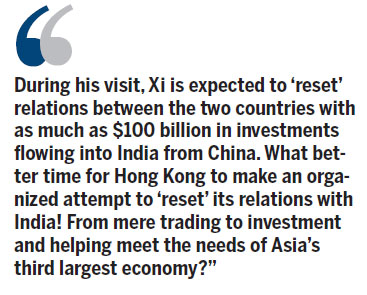Time is right to rejuvenate Hong Kong-India relations
Updated: 2014-09-19 10:12
By N.Balakrishnan(HK Edition)
|
|||||||||
Hong Kong has a significant Indian community and much in common with India such as the British-derived law and the English language. Despite this however, I have found knowledge of India, even among the highly educated classes, to be either limited or wrong. The strange point is that the mainlanders have a sound knowledge of India, particularly its history and culture. This is despite the fact that the Chinese mainland was "closed" for a long period, between 1950 and 1979.
With President Xi Jinping's official visit to India this week, it is appropriate to re-examine political and financial relations between the two countries, not forgetting their historic shared links through Buddhism.
The mainland has no significant Indian community. During the "closed" period it conducted little trade with India and did not have close political relations with India. But now mainland radio stations broadcast in Indian languages and various universities boast well respected graduate departments specializing in Indian studies.
The superior knowledge of India found on the mainland, compared with Hong Kong, derives from the fact that mainland schools teach Indian history. They do this emphasizing its struggle to establish itself after the British reluctantly granted independence to India after World War II. By contrast Hong Kong's British-inspired history books do not even appear to teach Chinese history well, let alone the history of India. But maybe Hong Kong should change this as the Indian economy expands and relations between New Delhi and Beijing seem set to reach new heights.
To gain an idea of how little impact India has had on Hong Kong, one only has to compare the effects that other big Asian economies, such as Japan and South Korea, have had upon Hong Kong, even though the South Korean economy is smaller than India's.
The roots of the "Indian problem" in Hong Kong date back to the earliest days of Britain's settlement in the 1840s. As part of the British "divide and rule" policy, the British brought in Indian policemen to enforce the law in Hong Kong.
From the beginning there were also rich Indian merchants, some dealing in opium. For the people of Hong Kong this meant having to accept being policed by Indians. This tainted relations between the people of Hong Kong and its Indian population. Nevertheless there were other more significant Indian contributions to early Hong Kong. For example Mody Road in Tsim Sha Tsui is named in honor of an Indian philanthropist, while the Star Ferry was founded by an Indian in 1888 and an Indian businessman generously contributed towards financing the University of Hong Kong.
Meanwhile the partition of India to create Pakistan between 1947 and 1957 (another British ruse!) has also resulted in some unexpected, negative consequences among the Indian community in Hong Kong. The Sindhis, primarily Hindus, and the richest Indian merchant community in Hong Kong, originate from the province of Sind, which is now part of Muslim-majority Pakistan. Large numbers of wealthy Sindhis have remained in Hong Kong to this day, though the partition of India meant the Sindhi community was isolated from its "homeland" and so they stopped investing there.
In the 1970s Hong Kong-based Indians were at one point among the richest in the world. They have not really played much of a role in the rise of the Indian economy over the last two decades, however. Some of those from "British India" and their descendants have now become "Pakistanis" and thus are not really part of the "Indian" community. Jobs previously open to Pakistanis, such as the police, are no longer available to them.
Owing to such historical factors, the Indian community in Hong Kong punches far below its weight in the SAR despite the growing importance of the Indian economy.

During his visit, Xi is expected to "reset" relations between the two countries with as much as $100 billion in investments flowing into India from China. What better time for Hong Kong to make an organized attempt to "reset" its relations with India! From mere trading to investment and helping meet the needs of Asia's third largest economy?
The usual response of Hong Kong officials is to say the territory is a free market and point to the thriving trade that already exists between Hong Kong and India, amounting to in excess of $10 billion annually. But current developments in India provide Hong Kong with the opportunity to move on from trade to investment within India, rather than to allow economic relations to stagnate.
Let us hope Xi's visit to India will lead to a rethink of Hong Kong's India policy.
The author is a former foreign correspondent who has lived in Hong Kong for the past two decades. He is currently the CEO of a company listed on the Hong Kong Stock Exchange.

(HK Edition 09/19/2014 page1)